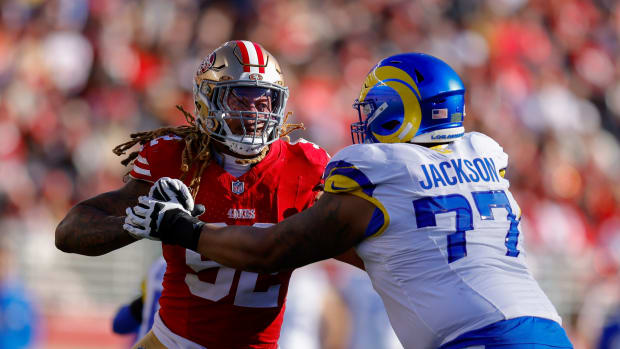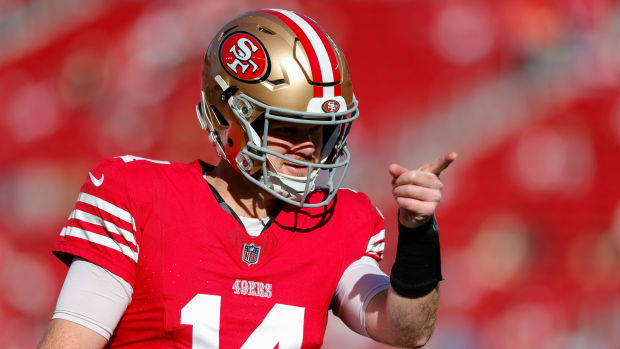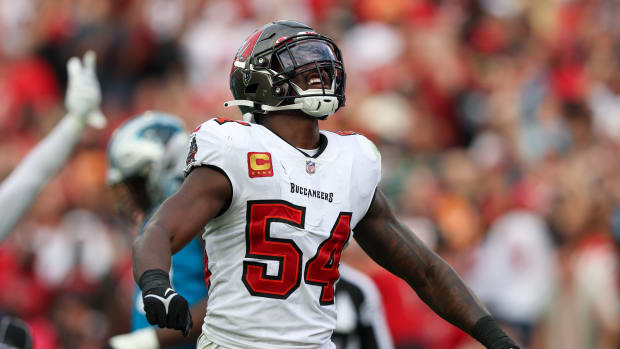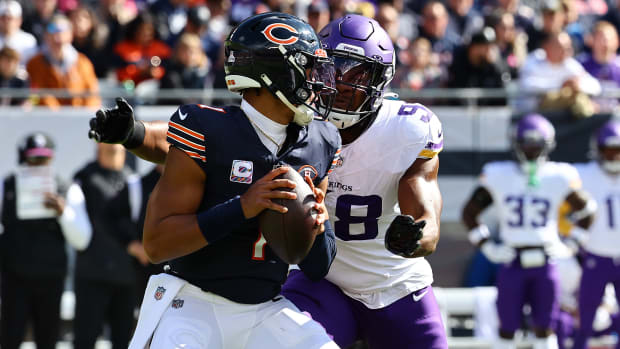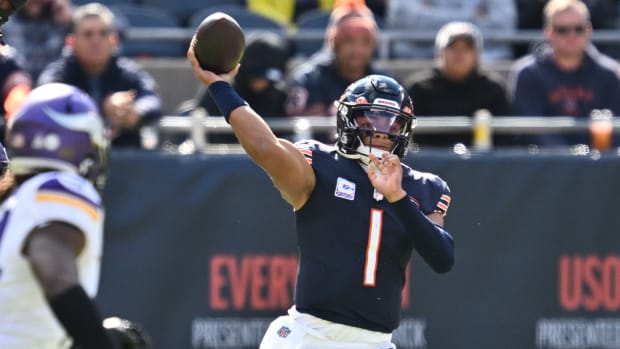Ted Ginn Jr.’s NFL comeback spurred by his father's comeback from cancer
CHARLOTTE — The father and his namesake hit bottom together all at once. In the fall of 2012, the legendary Cleveland-area high school football coach Ted Ginn Sr. was diagnosed with pancreatic cancer at age 57. The one-year survival rate? Twenty percent. He spent 65 days in the hospital, underwent six surgeries, suffered myriad infections and lost his spleen and half his pancreas.
In November that year, he spent a week on life support, breathing through machines. At another point, he stole a glance at his doctor and noticed … tears. His doctor was crying. That’s how bad it was.
Stephanie Rivera opens up about husband Ron’s success with Panthers
Sundays were the worst. Ginn lay in the hospital bed and tried to follow the NFL career of his namesake, Ted Ginn Jr. Only there wasn’t much to follow. Not that season. Junior was in his sixth NFL campaign, his third with San Francisco, and it wasn’t working out. He played in 13 games that year, starting none, and caught only 32 passes. He scored no touchdowns for the first time in his career. Senior wasn’t only his dad. Senior was his coach. Senior was everybody’s coach.
Junior called every Sunday after his games ended. On some days, Senior was too weak to even speak. He’d have someone hold the phone to his ear, and he would listen to Junior vent. It nearly broke him. “All those days in the hospital, all I could think about was my kids, my players—and my son, and how I wanted him to be successful,” Senior told SI.com in a phone interview last week. “I could hear the hurt in his voice, and it hurt me. He went through that, and he didn’t have me to support him. That was the lowest point in his life and the lowest point in my life as well.”
It hurt Junior just as much. “My old man went down,” he said. “And to know that every day I had to get up and go play football for somebody who didn’t cherish me, that was hard. Real hard. It’s your dad on his deathbed. I’m not kidding—on his deathbed.”
A few weeks before the playoffs started after that 2012 season—Junior can’t remember exactly when—word arrived: he needed to come home. His cousin told him his father’s condition had worsened. So Junior flew back to Cleveland and surprised Senior, arriving at the hospital at 6 a.m. Junior cannot explain what happened next. But his father’s health improved. “From that day on, man, I’ve seen a difference in my dad,” Junior said.
Opponents of Cam Newton’s critics easier to find than critics themselves
The 49ers played in Super Bowl XLVII in New Orleans in Feb. 2013. In their 34–31 loss to the Ravens, Junior returned one kickoff 31 yards and one punt 32 yards. He was targeted once as a receiver. His father was there. He watched the game from a wheelchair.
Fast forward to January 2016. Junior is in Carolina now, and against the Cardinals in the NFC championship game, he scores on a 22-yard run and catches two passes for 52 yards and returns two punts for 38 yards and dashes half the field to catch cornerback Patrick Peterson on an interception return, saving a touchdown. The Panthers triumph, 49–15, to advance to Super Bowl 50 against the Broncos. Afterward, Junior tells Senior the same thing he always says. “We did it, Pops.”
***
“I had to prove to my old man that I could play,” Junior said. “Then I just took off.”
During more than 30 years of coaching football players and track athletes, Ted Ginn Sr. helped more than 100 kids obtain scholarships. He has sent two dozen players to Ohio State’s powerhouse football program alone, Junior included. In many ways, Junior represents his life’s work. “I know him so well, I can almost control what he’s going to do and how he’s going to do it,” Senior said. “When he took that kickoff back in the national championship game (in 2007, in a loss to Florida), I knew he was going to do that.”
Little-known fact: before Ginn became arguably the fastest player in pro football, he was actually slow. He ran a 5.1-second 40-yard dash in ninth grade—or 0.3 seconds slower than Broncos quarterback Peyton Manning’s best dash as an NFL rookie.
Megatron said he wanted to be best ever; now, he's likely saying goodbye
Together, Junior and Senior changed that. They did track work every day. They hired a personal trainer, saw a nutritionist, even measured Junior’s sleep schedule, with him in bed each night at 10 p.m. He became one of the fastest hurdlers in the country and one of the most sought-after defensive backs. By the time he signed with Ohio State, he had run the 40 in 4.28 seconds.
Jim Tressel, the Ohio State coach, put Junior on offense to capitalize on that speed. Junior didn’t care where he played. He just wanted to impress the man that he called Pops. “I had to prove to my old man that I could play,” Junior said. “Then I just took off.”
The years flew by like Junior on a go-route: the starting spot he earned his sophomore season, the Heisman consideration before his junior year, the Big Ten record for career punt returns (6), the first-team All-American awards. Junior went ninth overall to the Dolphins in the 2007 draft. But from that point, his career unfolded unevenly, up, then down, forward, then backward.
That was Junior: always fast, always tantalizing, but never able to chase down consistency. He bounced from Miami (three seasons) to San Francisco (three seasons) to Carolina (2013) to Arizona (’14). His season with the Cardinals marked his second-worst campaign, after 2012, when he caught all of 14 passes for Arizona.
Junior rarely spoke out or talked back or disparaged the organizations that sat him or let him leave. Senior taught him that: to be respectful, to see himself as an employee, his employer worthy of deference. “But it was hard,” Senior said. “People misread that, like he didn’t care. It was hard on me because I knew him. I’m not just his dad. I’m his coach. I know what he can do.”
The Cardinals cut Junior loose in February 2015, and the first potential landing spot he suggested to his agent was Carolina. Cam Newton, the Panthers quarterback, wanted Junior as much as anyone, and advocated for his return. Junior signed for two years at a discounted $4.2 million with $1.7 million guaranteed.
Think Super Bowl 50 will be huge? Imagining the 100th edition
So there was Junior, reunited with the Panthers in 2015, catching passes from Newton and running reverses and returning punts. He helped replace Kelvin Benjamin, the Panthers’ top target who was lost to a torn left ACL before the season started.
Junior’s speed remained, even nine years in. Ginn was clocked at 22.44 miles-per-hour on a 74-yard touchdown sprint against the Falcons in Week 14. That was the fastest speed any NFL player reached this season, according to the NFL Network. And almost as fast as Usain Bolt ran the 100 meters when he set the world record of 9.58 seconds. Bolt was going 23.35 miles per hour, and he wasn’t wearing pads, or running away from large men with bad intentions. Junior, the Usain Bolt of the NFL, scored 10 touchdowns this season as Senior watched.
“I’m happy for him being happy,” Senior said. “In his career, things haven’t always fallen into place, for whatever reason. It has been a long nine years for him, and now, all of the pieces have come together. I still think, even at age 30, he has potential that’s untapped.”
Ginn called his father after that return. He said the same thing he always says. “We did it, Pops.”
***
“I’m not saying I’m doing this for him,” Junior said. “We’re doing this, we’re doing life, for each other. We get joy from this. We.”
Senior opened an all-boys school in Cleveland in 2007. He called it both the Ginn Academy and a sociological experiment. His goal: to disprove myths and perceptions about inner-city high schools. He often carried a medicine bag to work, complete with a stethoscope so that he could “treat” each of his players. He gave them Lifesavers as “medicine” and virtually all his time.
His students wore uniforms with ties, and they went to class—Senior made sure of that. They were polite—he made sure of that, too. Some played football for nearby Glenville High School, Senior’s alma mater, and the place where he served as the head football and track coach. He had been a security guard at Glenville before he proposed Ginn Academy. His football teams at Glenville won what seemed like a million games, made the state playoffs more than a dozen times, and bred NFL prospects, Junior included. The school he started did the football team one better. It took on kids from troubled backgrounds, kids that other schools gave up on, and posted a graduation rate of 93%.
Senior looked for diamonds that needed polishing. “They’re all around the inner city, lying on the ground,” he said. “I’d pick them up, and I’d wipe them off. I’d advocate for them.”
Inside exclusive club of coaches who led two different teams to Super Bowl
As his son’s career stopped and started, stalled and soared and stalled again, Senior felt the same way. Somebody would find Junior, polish him up and find him the right role. “My son has the heart of a lion,” Senior said. “He ain’t never going to give up. He would give you his arm to get things right.”
After the cancer, after the lost season in Arizona, after Junior’s return, everything fell into place. Senior returned to coaching, even though Junior wants him to retire and spend his time watching football games without the stress. “He’s always been a superstar,” Junior said. “It’s time to be a regular person. Time to relax.”
“My son wants me to stop,” Senior said. “He wants me to sit somewhere and play with my grandkids. But he knows me. I’m a coach.”
Senior never met an analogy he couldn’t make. And, as the Super Bowl approached, he said he feels like one of those patched-up leather coats, “pieces of kids all over me.” He takes a little bit from each of them, Junior included. There’s a cool cycle at work there. His return to coaching means more comebacks for kids in inner-city Cleveland, which was spurred by his own comeback from cancer, which in turn spurred his son’s comeback, which led both of them to Super Bowl 50. Senior will be there, but not in a wheelchair. He will be sitting in the stands.
“I’m not saying I’m doing this for him,” Junior said last week at his locker. “We’re doing this, we’re doing life, for each other. We get joy from this. We.”
Junior has already considered the possibility: that the Panthers will win with his father in the stands, in better health, with Junior playing more than he did the last time on this stage. In victory, he would give the championship ring to the man who shaped him, the man who survived cancer, and he knows exactly what he’ll say.
“We did it, Pops.”
































